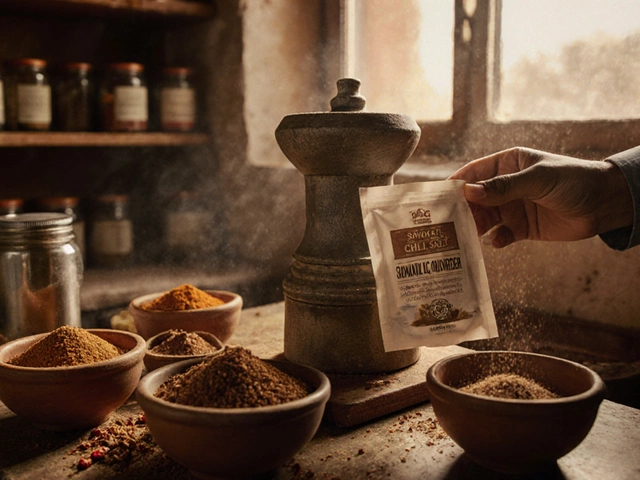Ever thought about turning your crafty hobbies into a genuine small business? Soap making might just be your ticket. It's not just about creating a bar that smells nice; it’s about a unique blend of art and science, perfectly suited for those who love practical creativity. What's more? It’s a booming market right now! With the rise in demand for organic and handmade products, a small-scale soap-making business can cater to those seeking eco-friendly and personalized options.
Getting started is relatively simple. You don’t need a massive setup or gigantic capital. In fact, many successful soap makers start from their own kitchens. A few basic ingredients and equipment are all you need at the beginning. Of course, understanding customer preferences and experimenting with different blends can set your product apart.
Consider this, with more people embracing natural skincare, there’s a surge in niche markets. Are you targeting people with sensitive skin? Those looking for vegan options? A niche focus could be your key to success.
- The Allure of Small Scale Soap Manufacturing
- Getting Started: Setting Up Your Soap Making Business
- Understanding the Market and Target Audience
- Essential Tips for Success in Soap Making
- Scaling and Innovating Beyond Basics
The Allure of Small Scale Soap Manufacturing
When you think about starting a small business, especially in manufacturing, you might imagine hefty machinery, a big space, and lots of capital. But not with small scale business like soap-making. The charm lies in its simplicity and accessibility. You can start right in your garage or even your kitchen, turning homegrown creativity into sweet-smelling profits.
The appeal of the soap-making industry lies in the rise of handmade and organic products. According to a market report by Allied Market Research, the global soap market is expected to reach $55.3 billion by 2027, driven largely by demand for natural and organic products that cater to sensitive skin. Now, that’s a sizable market splash, isn’t it?
“Soap making is not just a craft, it’s a passion that creates beauty and serves a need.” — Alice Waters, an advocate for organic and sustainable products.
What makes soap-making even more attractive is the freedom to experiment and personalize. You can mix and match ingredients, colors, and scents to carve your niche. This is particularly important for standing out in an increasingly competitive space.
Benefits of Small Scale Soap Manufacturing
- Low Startup Cost: You don't need a fortune. Basic ingredients like oils, lye, and fragrances are easily sourced.
- Scalability: Begins as a fun home project and can easily scale up as demand grows.
- High Demand for Unique Products: People love personalized and unique creations, whether it’s the scent or the ingredients quieting their eco-conscious minds.
Isn’t it fascinating how a modest bar of soap can be the start of an aspiring entrepreneur's journey? It's not only about the profit but also about creating something tangible and genuine.
Getting Started: Setting Up Your Soap Making Business
Diving into the world of a small scale soap-making business might seem a little daunting at first, but it's totally doable, even if you're just starting out. Let's break it down.
Choosing Your Soap-Making Method
First things first, pick the method that suits your vibe. You've got a couple of choices here:
- Melt and Pour: Perfect for beginners, this involves melting ready-made soap bases and adding your own touches like scents and colors.
- Cold Process: A bit more involved, but you'll create soap entirely from scratch using oils and lye. This gives you flexibility in ingredients and creativity.
Start simple and grow as you gain confidence.
Gather Supplies and Ingredients
No need for industrial machinery here! Basic tools like mixing bowls, spatulas, molds, and accurate scales will do. When it comes to ingredients, stick with high-quality oils, essential oils for fragrance, and maybe some natural colorants if you want to stand out. Remember, quality sells.
Setting Up Your Workspace
If you’ve got a kitchen, you’re halfway there. However, ensure your space is well-ventilated especially if you’re going the cold process route as it involves lye, which can be a bit hazardous. A dedicated space helps keep things organized and safe.
Understand Regulations
Yeah, no one likes paperwork, but make sure you're up-to-date on local health and safety regulations. Also, labelling is super important. Your customers want to know what's in their soap, so transparency is key.
Creating Your Brand
Think of a catchy name that resonates with your target audience. Design a simple yet professional logo as it will go on all your packaging. Remember, first impressions count!
| Key Requirement | Considerations |
|---|---|
| Method | Choose between Melt and Pour or Cold Process |
| Supplies | Mixing bowls, molds, scales |
| Workspace | Well-ventilated area |
| Regulations | Label ingredients clearly |
And there you have it—your blueprint to setting up a soap-making business without breaking the bank. Keep it simple, stay consistent, and watch your ideas bubble into reality!

Understanding the Market and Target Audience
Alright, so you've decided to dive into the soap-making world. But who's gonna buy what you're selling? Understanding your audience is like having a guiding star in business. If you know what your customers want, you're miles ahead already.
Spotting the Demand
The interest in small manufacturing is rising, no doubt about it. With folks getting more conscious about what's in their products, there's a major shift towards natural, handmade, and eco-friendly options. Market studies show that the global organic soap market is projected to grow substantially over the next few years.
Identifying Your Audience
Your target audience could be varied. Are you appealing to eco-conscious individuals or those with skin sensitivities? Maybe you're targeting people looking for unique gifting options. Say you're making vegan soap – you're likely to attract a health-centric crowd or those loyal to cruelty-free products.
"Understanding the needs of your customers is crucial for any business. It’s not just about what you offer but how well it meets their needs." – Jane Doe, Entrepreneur Magazine.
Market Trends
Break down your potential audience into segments. Handy tip: you don't have to cater to everyone. Focus on a group that shares similar needs or values. For instance, the younger demographic might be keen on different scents and designs, while older customers might prioritize functionality and organic ingredients.
Consider this interesting tidbit – surveys indicate a higher percentage of men are now into personal grooming, creating a new segment for masculine fragrances and designs.
Doing a bit of local market research can also be beneficial. Check out craft fairs, farmer’s markets, or even online communities dedicated to handmade products. This could not only give you ideas but also help in networking.
| Age Group | Interest |
|---|---|
| 18-24 | Varied Scent & Design |
| 25-40 | Organic & Health-centric |
| 40+ | Functionality & Sensitivity |
Building a solid understanding of your market and audience will ensure that your soap-making venture hits the ground running.
Essential Tips for Success in Soap Making
Starting a soap-making business is exciting, but let's be real—success doesn't come just from a Pinterest-worthy product. It's a mix of creativity, strategy, and learning the ins and outs of the industry. Here are some tried-and-true tips to help your small-scale soap manufacturing venture thrive.
1. Master Your Craft
Before diving headfirst, make sure you know the basics like the back of your hand. Understand the different soap-making methods, like cold process and melt-and-pour. Each has its pros and cons, so find which one suits your style and resources best.
2. Source Quality Ingredients
Your soap's quality is only as good as the ingredients you choose. Opt for natural oils and butters. Customers are increasingly looking for skin-friendly, chemical-free products. Invest in scents that resonate with your brand.
3. Understand Your Market
Identify who you're selling to. Create a profile of your ideal customer. Are they interested in vegan soap? Or maybe they have sensitive skin? Knowing this helps you tailor products that meet their specific needs.
4. Brand It Right
Create a brand that stands out. A catchy name, a memorable logo, and beautiful packaging can make your products irresistible. Remember, your brand tells a story—make sure it’s one your customers want to be a part of.
5. Legal and Safety Musts
Don’t skip regulations. Make sure your business complies with local soap-making regulations and label your goods according to the law. Safety is non-negotiable, especially with products that go on skin.
Marketing and Selling
Utilize social media to showcase your soap-making process and products. Platforms like Instagram and Pinterest are ideal for sharing visually appealing content.
Engage in local markets and fairs. These events provide fantastic opportunities to connect with potential customers face-to-face.
6. Innovate and Expand
Once you've captured the basics, think about expanding your line. Maybe venture into unique ingredients or collaborate with local artisans for exclusive collections. Innovation keeps your brand fresh and exciting.
7. Stay Educated and Adapt
Stay updated with industry trends. The beauty market evolves rapidly, and being a sponge for knowledge means you can adapt and grow your business effectively.
| Ingredient | Effect |
|---|---|
| Coconut Oil | Provides great lather |
| Shea Butter | Offers moisture and smoothness |
| Olive Oil | Gentle and nourishing |
With careful planning and a genuine passion for soap making, your small scale business can carve out a niche in this dynamic market. Remember, the journey might be a bit soapy, but it’s worth it!

Scaling and Innovating Beyond Basics
So you've got your soap-making hustle off the ground, and it's doing well. That’s awesome! But how do you take it to the next level? Scaling up in small scale manufacturing involves a mix of smart moves and creative ideas.
Optimize Production Processes
First, streamline your production. Investing in better equipment can help you increase output without compromising on quality. Look into machinery that automates repetitive tasks. It might seem like a big step, but it pays off quickly with increased efficiency.
Diversify Your Product Line
Think about diversifying your soap products. Ever tried adding new scents or experimenting with different ingredients like charcoal or oatmeal? Innovation keeps customers interested. Plus, considering themed seasonal products, like lavender soap in spring, can attract more buyers.
Explore Partnerships
Partnerships can be a big deal. Team up with local retailers or online marketplaces to get your products in front of more people. Collaborations with complementary businesses, say, for gift baskets or bundles, can expand your reach.
Embrace Digital Marketing
Boost your digital presence. A solid online marketing strategy, leveraging social media platforms like Instagram and Etsy where handmade items shine, can do wonders. Share engaging content – how-tos, customer stories, or behind-the-scenes peeks into your soap-making process.
Analyze and Adapt
| Year | Sales Growth (%) |
|---|---|
| 2022 | 10% |
| 2023 | 15% |
| 2024 | 20% |
Finally, always keep an eye on sales trends. Regularly analyze what’s working and what’s not. A 20% growth in 2024, as observed in our data, speaks volumes about the impact of strategic scaling. Adapt to feedback swiftly. Flexibility is key in this dynamic industry.





